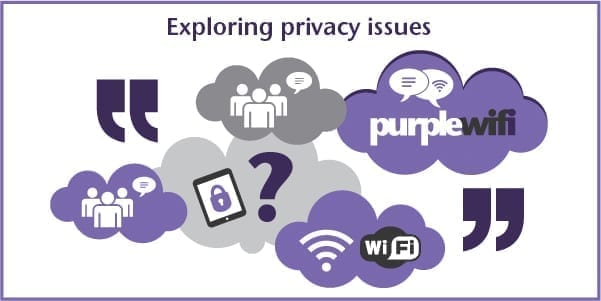With the proliferation of WiFi enabled devices, data usage and surge in internet connectivity worldwide, and the predictions of how everything from our refrigerators to our cars will soon be connected to the internet, the ‘privacy debate’ is becoming more important than ever.
With shocking personal data thefts being reported like the epic hacking of Target’s POS systems, the sophisticated cyber attack on Adobe, the criminal sale of US social security numbers, people are quite rightly feeling nervous about it. Then today’s news about the Apple iOS8 release including features that will make it harder for companies to track movements online has got everybody talking.
So, when is it going to be ‘ok’ for governments, brands and businesses to capture and store both anonymised and personal data?
At Purple WiFi, we get asked about this a lot and we’ve spent quite some time debating and considering the topic. We thought we’d put some thoughts down on ‘paper’.
In what ways can data be collected from a mobile?
Nowadays, we’re all used to our data being captured online as we go about life using social media or researching, playing or shopping online. The data we share when we go online, including what sites we visit, what actions we take or what we buy, is being used to tailor adverts that we see, or provide money off vouchers to us. Consumers are becoming much more aware of this marketing tactic as relevant promotions appear on their timeline or on websites they are surfing.
What we aren’t used to, is similar data being captured from our mobile devices. Venues can now access certain data from your mobile device without you knowing, including your MAC address (unique number associated with your device). Then, in return for providing customers with free WiFi and applications that improve their experience in venues, personal data such as email addresses are being collected – on a strictly opt in / opt out basis of course.
So, how does it work?
As long as WiFi is enabled, a smartphone can be detected, indicating a customer’s presence, working out the device type and whether they are a new or repeat visitor, and the time spent online in that venue.
So that’s all anonymous, right? It is until they log in to the WiFi.
If a customer accepts Terms and Conditions to access the WiFi they can also receive vouchers, money-off codes and offers, or gain access to tools like wayfinding applications or live in-store stock checkers.
Location, location, location
With the introduction of location based services, things get even more interesting. This will transform retail and it’s explained perfectly by Tony Costa, who describes how these analytics can improve design, marketing, operations and strategy.
How is that different to people storing cookies about us online?
Furore around cookies means that everyone now sees that message to ‘accept or decline’ cookies along with the website’s T&Cs – but does anyone read and understand them? Many may well agree with Facebook founder and CEO, Marc Zuckerberg, who stated recently that private content access enables marketers to create a more compelling user experience.
When Tesco introduced the Clubcard for data capture and Amazon started to uses cookies to remember who you are next time you visit (cookies are text boxes allowing a website to store information on a user’s machine and later retrieve it), there was a similar concern about privacy of data. However, consumers seem to get over those concerns as Tesco’s Clubcard grew in popularity. And Amazon’s profit figures say it all. Why? Because they enhanced a shopper’s experience compared to anything we had seen before, drawing their attention to relevant offers and rewarding loyalty.
What other things are invading our privacy, and are they good or bad?
CCTV, which records us wherever we go (whether we like it or not) is now a normal part of everyday life. In fact, it can make us feel safe but there are still those who feel it’s all a bit too ‘Big Brother’. The proponents in favour of CCTV say that it deters crime as perpetrators are more likely to be caught. In London alone a vast number of criminals have been caught using CCTV as evidence. Opponents would say that crimes are still committed outside the view of the cameras or with masks and they feel it’s a breach of civil liberties to film people in public places who are doing nothing wrong. Then again, the argument would be that if you’re doing nothing wrong, you have nothing to worry about!
Social media takes this sharing of information and personal visibility a stage further and even plays a role in finding missing people where searchers on the ground have failed. Drones are now being used in search and recovery missions across huge areas with outcomes that present a very good argument for this activity to continue.
A summary of our thoughts
We believe that it all comes down to businesses being responsible with the data, and allowing customers the choice to opt in and out at will. Privacy and the issues around it will always evolve; but as long as the people are in control and have their say things should – for the most part – work for the good. (We hope.)
